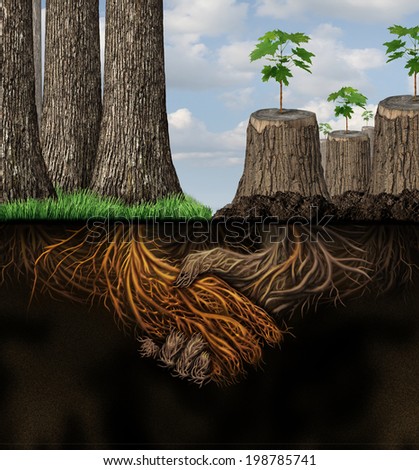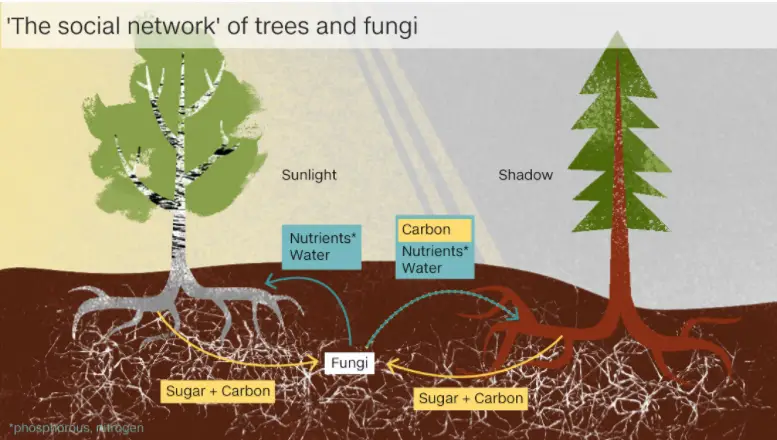Trees Communicate With One Another Through The “Underground Web”
Posted on 2019/07/24

By John Vibes / Truth Theory
For decades, scientists have known that trees communicate with one another through a network of underground fungi, which even allows them to trade nutrients back and forth. This incredible discovery was first made by ecologist Suzanne Simard when she was researching her doctoral thesis over 20 years ago.
After her discovery, she was inspired to continue her research in the field and learn more about how trees live and interact.
In her research, Simard used radioactive carbon to measure the flow and sharing of nutrients between individual trees and species.
She found that trees help each other out by watching interactions between Birch and Douglas Fir trees. Simard observed that Birch trees receive extra carbon from Douglas Firs when the Birch trees lose their leaves, and Birch trees provide carbon for Douglas Fir trees that are in the shade.
Simard discovered that a very complex social relationship exists between various forms of plant life. One incredible example of this is the “hub tree, or “mother tree,” which is the tallest tree in the forest that usually acts as a central hub for the underground network of fungi.
Mother trees help the rest of the trees in the forest grow by supplying them with nutrients. In a similar fashion, older trees supply nutrients to younger trees that are just getting started.

In some cases, trees that are sick and unhealthy will receive a boost of nutrients for their neighbors. Conversely, if a tree determines that they are going to die, they will get rid of all of their nutrients and distribute them among its neighbors so they don’t go to waste.
These processes make it possible for trees to survive through the harsh conditions that they will inevitably encounter, and allows older trees to nurture their offspring while they are more vulnerable.
On rare occasions, the web of fungi used by trees to communicate can be hijacked by more selfish trees who use the network to enrich themselves at the cost of surrounding trees, but this type of activity is limited to a few select plant species. Generally, researchers have found trees to be altruistic and very generous with their nutrients.
This astonishing system explains why plantlife has been so resilient through many centuries here on earth. The trees around us are not inanimate fixtures of our environment, but a living breathing ecosystem filled with relationships that are just as complex, if not more so, than our human relationships.
In her TED Talk below, Suzanne Simard describes her research:
IMAGE CREDIT: lightwise

John Vibes is an author and journalist who takes a special interest in the counter culture, and focuses solutions-oriented approaches to social problems. He is also a host of The Free Your Mind Conference and The Free Thought Project Podcast. Read More stories by John Vibes
MORE HERE: https://truththeory.com/2019/07/24/trees-communicate-with-one-another-through-the-underground-web/
Thanks to: https://truththeory.com
Posted on 2019/07/24

By John Vibes / Truth Theory
For decades, scientists have known that trees communicate with one another through a network of underground fungi, which even allows them to trade nutrients back and forth. This incredible discovery was first made by ecologist Suzanne Simard when she was researching her doctoral thesis over 20 years ago.
After her discovery, she was inspired to continue her research in the field and learn more about how trees live and interact.
In her research, Simard used radioactive carbon to measure the flow and sharing of nutrients between individual trees and species.
She found that trees help each other out by watching interactions between Birch and Douglas Fir trees. Simard observed that Birch trees receive extra carbon from Douglas Firs when the Birch trees lose their leaves, and Birch trees provide carbon for Douglas Fir trees that are in the shade.
Simard discovered that a very complex social relationship exists between various forms of plant life. One incredible example of this is the “hub tree, or “mother tree,” which is the tallest tree in the forest that usually acts as a central hub for the underground network of fungi.
Mother trees help the rest of the trees in the forest grow by supplying them with nutrients. In a similar fashion, older trees supply nutrients to younger trees that are just getting started.

In some cases, trees that are sick and unhealthy will receive a boost of nutrients for their neighbors. Conversely, if a tree determines that they are going to die, they will get rid of all of their nutrients and distribute them among its neighbors so they don’t go to waste.
These processes make it possible for trees to survive through the harsh conditions that they will inevitably encounter, and allows older trees to nurture their offspring while they are more vulnerable.
On rare occasions, the web of fungi used by trees to communicate can be hijacked by more selfish trees who use the network to enrich themselves at the cost of surrounding trees, but this type of activity is limited to a few select plant species. Generally, researchers have found trees to be altruistic and very generous with their nutrients.
This astonishing system explains why plantlife has been so resilient through many centuries here on earth. The trees around us are not inanimate fixtures of our environment, but a living breathing ecosystem filled with relationships that are just as complex, if not more so, than our human relationships.
In her TED Talk below, Suzanne Simard describes her research:
IMAGE CREDIT: lightwise

Written by: John Vibes
John Vibes is an author and journalist who takes a special interest in the counter culture, and focuses solutions-oriented approaches to social problems. He is also a host of The Free Your Mind Conference and The Free Thought Project Podcast. Read More stories by John Vibes
MORE HERE: https://truththeory.com/2019/07/24/trees-communicate-with-one-another-through-the-underground-web/
Thanks to: https://truththeory.com






 Sat Mar 23, 2024 11:33 pm by globalturbo
Sat Mar 23, 2024 11:33 pm by globalturbo

